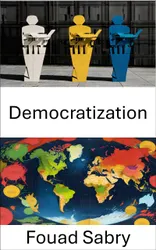In the complex world of political science, understanding "Voting Behavior" is key to deciphering why people vote the way they do. This book explores the psychological, demographic, and systemic factors shaping electoral outcomes. Whether you're a student, professional, or political enthusiast, you'll gain valuable insights into the dynamics of voting patterns and political participation. From the fundamentals of voter behavior to the influences of political identity, this book covers the essential elements driving democratic engagement.
Chapters Brief Overview:
1: Voting Behavior – Study psychological and sociological drivers behind voting.
2: Plurality Voting – Examine how plurality voting affects elections.
3: Theories of Political Behavior – Explore rational choice and sociological theories.
4: Voter Turnout – Review demographic and election-related turnout influences.
5: Political Polarization – Analyze political divisions and their democratic impact.
6: Party Identification – Investigate the impact of party loyalty on voting trends.
7: Women in Government – Study how women in politics affect voting behavior.
8: U.S. Presidential Voter Turnout – Assess turnout trends in presidential elections.
9: U.S. Voting Gender Gap – Understand gender-based voting differences.
10: Voter Segments in Polling – Learn how polling divides voters into segments.
11: U.S. Politics – Understand how the U.S. system shapes voting behavior.
12: League of Conservation Voters – Examine environmental advocacy’s electoral impact.
13: Swing Vote – Explore the role of swing voters in elections.
14: Hispanic and Latino Politics – Study the electoral influence of Hispanic and Latino voters.
15: Gender Inequality – Discuss how gender inequality affects politics.
16: Latino Vote – Analyze the increasing influence of the Latino vote.
17: Political Identity – Delve into how political identity shapes voter preferences.
18: Sexism in U.S. Elections – Investigate the impact of sexism on electoral outcomes.
19: Political Cognition – Study how cognitive processes affect political judgment.
20: U.S. Political Polarization – Explore how political divisions affect voting.
21: Voter Turnout in European Elections – Assess trends in European Parliament turnout.
By examining these critical aspects of voting behavior, this book offers more than just facts—it provides a thorough understanding of the forces shaping democratic participation. "Voting Behavior" unravels the key elements influencing voter decisions, offering readers a deeper grasp of political dynamics and election outcomes.
























